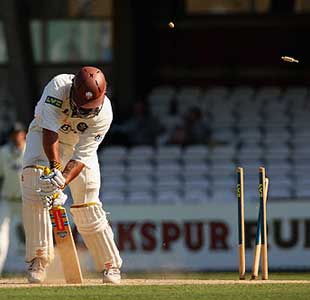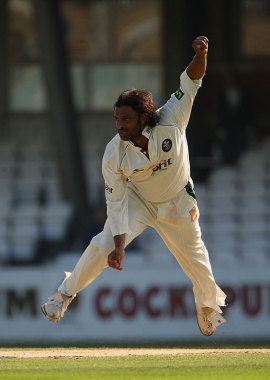
|

The year it all went pear-shaped: Surrey didn't take enough wickets, dropped far too many catches, and were brittle with the bat
© Getty Images
|
|
Surrey are supposed to know all about schadenfreude. In the days when the swagger was said to be the favoured gait around Kennington, they were accused of doling it out. Last summer, though, they attracted it by the lorry-load. The side that lifted the County Championship in 1999, 2000 and 2002 was relegated without winning a game. For Surrey the experience was unprecedented. And, well, it was hard to take.
"What disappointed me most was that some of the criticism was quite gleeful," says Mark Butcher, the captain, whose season finished in May because of knee trouble and whose father, Alan, ended up losing his job as cricket manager. The wicketkeeper, Jon Batty, agrees. "People are quick to stick the knife into Surrey for various reasons, most of them dating back to before the days when most of the guys currently at the club were even playing," he says. But Martin Bicknell, once the club's most reliable seamer, now a member of its committee, gets straight to the point. "We had a shocking year."
But why so shocking? How did a side that continues to top county cricket's financial league table fall so short out in the middle? The headline answer is "Not Enough Wickets". Not once in 16 games were the opposition bowled out twice, and only Saqlain
Mushtaq (three times) and Jade Dernbach (once) managed five wickets in an innings. But the stats hide a multitude of other sins, themselves a mixture of poor execution and even worse luck.
For a start, Surrey kept dropping catches - 46 in the Championship according to Batty. Since they held only 89, this meant they were missing more than one chance in three: their bowlers thus needed to create 30 wicket-taking opportunities per match to have even a sniff of victory.
Injuries and illnesses did not help. Butcher had been in prime form before his knee went, hitting 139 in a Friends Provident Trophy match in Canterbury, followed immediately by a Championship double-century against Yorkshire. Meanwhile Matt Nicholson, the leading wicket-taker in 2007, spent most of the summer struggling with flu. In the Championship he averaged 56 with the ball.
Butcher, who in late October underwent a successful second operation, pinpoints other areas too. "Injury and form meant that three of the four youngsters who had been emerging didn't do much this year," he says. "Jade Dernbach pulled through and became the first name on the teamsheet, but Chris Jordan was out injured with back and side problems, and James Benning had back injuries too." The fourth, Stewart Walters, averaged 15 in eight Championship innings.
Then there was Mark Ramprakash and his Godot-like wait for 100 hundreds. Opinion is divided over whether the delay - and one or two outbursts by Ramprakash himself - loomed detrimentally over the dressing room. Bicknell believes the 10-innings sequence between Nos. 99 and 100 "clearly got to him and that probably had an adverse effect on the side". But Butcher feels "it's too simplistic to say our season changed when Ramps stopped scoring runs". He adds: "It was poor that we were reliant on him. Contributions from other players were not consistent enough."
Never was Surrey's brittleness with the bat more evident than during a painful home defeat by Kent at the start of July. Batty, who insists the players remained united throughout the summer, points out that performances had not been bad during the weather-beaten first half of the season. Surrey made 500 against Lancashire, 400 against Sussex, 450 against Yorkshire, and in-between were two wickets away from beating Hampshire. But when they blew a first-innings lead of 127 against Kent by slipping from 50 without loss to 130 all out, it was as if not winning had become a habit.
"That was a massive kick," says Batty, whose first-innings 136 not out went to waste. "It really did hurt us. But what I've learned is that individual events swing individual matches, and individual matches swing whole seasons." If there was a turning point, the
defeat to Kent, inspired by Martin van Jaarsveld's twin hundreds and unprecedented five-for, was surely it. And since it came so soon after a disastrous Twenty20 campaign in which eight games were lost out of 10, the effect felt like a knee in the groin after a prolonged spell on the rack.
The weeks that followed were a mixture of bloodletting and introspection. Ali Brown, a Surrey stalwart for two decades, was released. Butcher senior had his contract terminated with a year still to go. Ramprakash wrote in a newspaper column that he
didn't want to finish his career in the second division, which may have been a message to the club hierarchy to get their act together rather than a genuine threat that he would leave. Shoaib Akhtar was widely derided for taking one wicket in two Championship appearances. Graham Thorpe was drafted in as batting coach, while Gus Mackay arrived from Sussex to take up the new role of managing director of cricket and oversee the appointment of Butcher's replacement.
In the wake of suggestions that the communication between players and management was not up to scratch, Mackay describes his role as trying to achieve "a joined-up approach and a no-excuse environment" with a focus on homegrown players and youngsters. "Otherwise," he says, "what's the point of investing money in academies?"
Reassuringly for those who felt Surrey have paid the price for failing to invest in younger talent when they were last relegated in 2005, Mackay talks of a "five- year plan". In theory, then, Oval members should be seeing more in 2009 of Matt Spriegel, Jordan, Walters and the 19-year-old seamer Stuart Meaker, and less of 30-something, readymade imports.
"I think it's a very positive thing for the club that we've gone down," says Mark Butcher. "If we'd stayed up we'd just have had the same problems next year. At the moment we're about the equivalent of 10th or 11th in the old 18-team league and that's no disgrace. It's where we were in the early 1990s. Now we have a chance to build a team like we did back then. You don't fashion something like this out of thin air. That side was six years in the making." The hard work may have only just begun.
Lawrence Booth writes on cricket for the Guardian. This article was first published in the December 2008 issue of the Wisden Cricketer. Subscribe here

